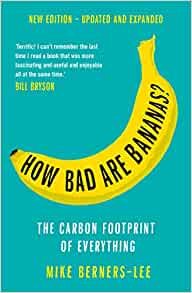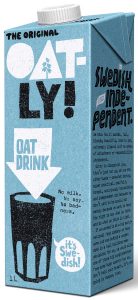People join cycling clubs for lots of different reasons – to learn more about cycling, to ride with like minded people, to get fit, to race, etc. An increasingly popular reason is because of concern about climate change, and a desire to reduce their carbon foot print.
 If the latter is a concern for you, then our latest book review – “How Bad are Bananas? – The Carbon Footprint of Everything” by Mike Berners-Lee – will be right up your street. It looks at the environmental impact of everything we do, from the familiar things like travel and food, to the less obvious like sending a text message or a war. As well as presenting the figures, Mike makes you think about why some things are worse than others, and offers realistic ideas for things you can change to reduce your impact.
If the latter is a concern for you, then our latest book review – “How Bad are Bananas? – The Carbon Footprint of Everything” by Mike Berners-Lee – will be right up your street. It looks at the environmental impact of everything we do, from the familiar things like travel and food, to the less obvious like sending a text message or a war. As well as presenting the figures, Mike makes you think about why some things are worse than others, and offers realistic ideas for things you can change to reduce your impact.
Needless to say cycling comes out well – the carbon footprint comes from the combination of the food you eat plus the embodied carbon from manufacturing the bike. To quote Mike, “Is cycling a carbon-friendly thing to do? Emphatically yes! Powered by low-carbon carbs, a well-used and well-maintained bike is about 10 times more carbon efficient than the average petrol car.”
But there are lots of other things for the cyclist to consider –
 “Low-carbon carbs“. What you eat makes a big difference. Bananas are good (because they can be grown without artificial heat in warm countries and then transported efficiently by ship. And they come with their own wrapper.) Cow’s milk on your cereal is a little dodgy (because of the methane produced by the cows), but Mike suggests oat milk as an alternative, and I’m now a convert. And blueberries flown from Peru are just crazy.
“Low-carbon carbs“. What you eat makes a big difference. Bananas are good (because they can be grown without artificial heat in warm countries and then transported efficiently by ship. And they come with their own wrapper.) Cow’s milk on your cereal is a little dodgy (because of the methane produced by the cows), but Mike suggests oat milk as an alternative, and I’m now a convert. And blueberries flown from Peru are just crazy.- “A well used bike“. If you do a big mileage on a single bike, then the embodied carbon per mile is very small. On the other hand, if you’ve lots of bikes and some only do a low mileage, the impact can be much higher. Perhaps the current trend for getting n+1 bikes (where n is the number of bikes you currently own – see rule 12) is not so wise. And a good second hand bike is definitely worth considering. (Well done Heather!)
- A quick shower when you come back from your ride could use 10 times less energy than a generous bath. And do you really need to wash all your cycling clothes after every ride? Just asking…
- Interestingly, electric bikes come out even better than non-electric bikes because generating electricity, storing it in a battery and then using it to power a bicycle is much more efficient than producing food, eating it, and then using muscles to power the bicycle.
First published in 2010, the book has just been thoroughly updated for 2020 and re-released. It now includes a chapter on “what we can do”. Bill Bryson’s comment on the cover of the book sums it up well, “Terrific! I can’t remember the last time I read a book that was more fascinating and useful and enjoyable all at the same time“. Thoroughly recommended.
(Foot note – if Mike’s name sounds familiar, you might be thinking of his brother Tim Berners-Lee who invented the World Wide Web.)
